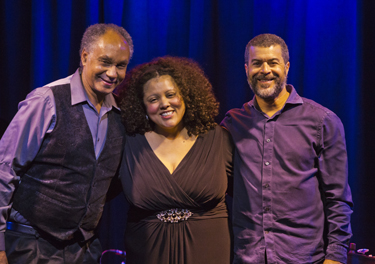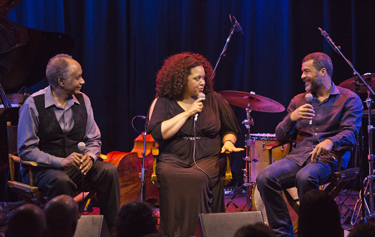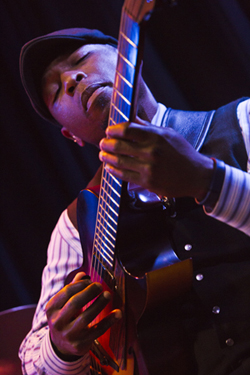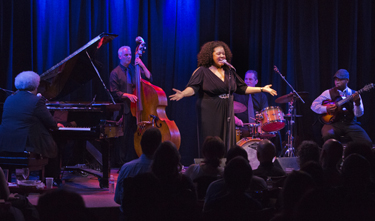Campus News
UC Santa Cruz Humanities Division celebrates International Jazz Day at Kuumbwa
A capacity crowd filled Kuumbwa Jazz Center Saturday night for “Race, Class, and Culture through the Lens of Jazz”–a special event presented by the UCSC Humanities Division, featuring a panel of jazz scholars, followed by an inspired performance by Bay Area jazz singer Kim Nalley.






A capacity crowd filled Kuumbwa Jazz Center Saturday night for Race, Class, and Culture through the Lens of Jazz–a special event presented by the UC Santa Cruz Humanities Division, featuring a panel of jazz scholars, followed by an inspired performance by Bay Area jazz singer Kim Nalley.
The occasion was both a celebration of UNESCO’s International Jazz Day and UCSC’s annual alumni weekend.
The evening began with a conversation about the global historical role of jazz in race, class, and culture, featuring humanities dean Tyler Stovall, history professor Eric Porter and jazz singer/historian Kim Nalley.
They talked about the African American roots of jazz and moved on to the political nature of the art form.
“Jazz is now essentially a century old,” Stovall noted. “People now call jazz America’s classical music. Different nations try to own jazz, but it’s distinctly an African American art form.”
“I think jazz has always been very much a political art form,” Stovall added. “It’s the politics of having African American culture showcased this kind of way. Having black players on stage was a political act. Or just the idea of performing before a mixed audience racially, which was something that you were not supposed to do.”
“Not following the notes as written is also political,“ added Nalley, who in addition to her burgeoning singing career is now pursuing a Ph.D. at UC Berkeley (her dissertation is titled “GI Jazz”).
“There’s always a lot of politics about just being on stage,” said Nalley. “It’s very hard for women to carve space in the jazz world. I recently gave birth to two beautiful girls, and I was very acutely aware that I’m from the first generation that’s allowed to perform onstage visibly pregnant and not have them cancel my gig or find a substitute.”
One audience member asked how to get jazz greater exposure beyond the elite. But Nalley questioned the assumption. “There’s a lot of great music in poorer neighborhoods where a lot of white people won’t go, so they just don’t know about it,” she responded.
“But she ultimately agreed with Porter, who pointed out that jazz needs to be taught in the schools. “Its one of those essential things that will continue to build this art form,” he noted.
After the panel, Nalley deftly switched roles from historian to jazz headliner.
She opened the show with a stunning version of “Summertime,” performing with no microphone and backed only by her acoustic pianist. From jazz ballads to gospel to rhythm and blues, Nalley had total command of the crowd, backed by piano, standup bass, guitar, and drums.
At one point after rocking the house, she sent her band away and sat down for a quiet song with her pianist, confiding: “I’m in very safe hands here in Kuumbwa—it’s like my living room.”
The show ended with a rousing version of Prince’s “Purple Rain.”
“I think a lot of black women and black people in general like to honor and archive their ancestors and I continue to do that in my music,” Nalley observed.
“I thought everybody could sing because my whole family sings. My great uncle played with Dexter Gordon. My aunt had some hits.”
“But I’ll always remember what my great uncle said before I went off to tour Europe: “Never forget that this is our music. You are representing us.”